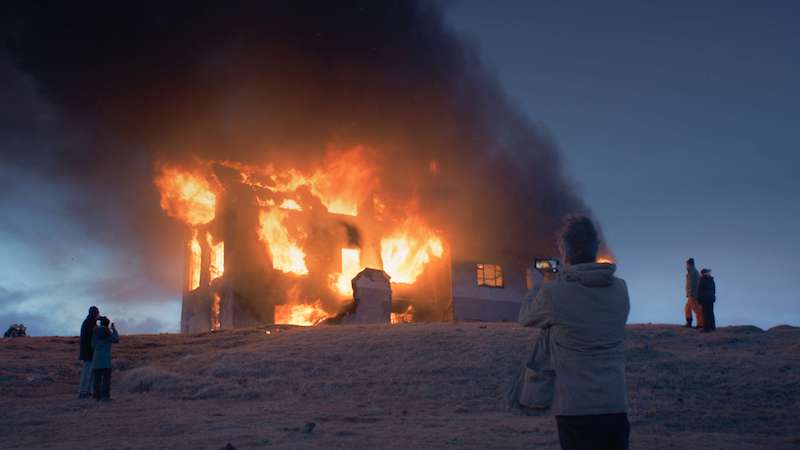




This film is basically Love Actually (Richard Curtis, 2003) directed by Roy Andersson. Comprised of only 56 static takes, Rúnar Rúnarsson calmly takes Iceland’s pulse during the Christmas season; delivering a panorama that is equal parts funny, sad, ironic and loving. Displaying a supreme confidence in direction and writing, this is a major step up in form and content.
I’m surprised Rúnarsson had something so sentimental within him. His last two films, Volcano (2011) and Sparrows (2015), are far harsher visions of life. In contrast, Echo takes in nearly every human emotion, all wrapped up in an inescapably sentimental Christmassy bow.
It spans through the Advent season to the New Year, that time of year when families are reunited, stress levels are high, and wallets are strained. Everyone is in the mood to either try and enjoy themselves, or simply get through the darkest days in the year. Spanning from rich to poor, old to young, alone or surrounded with family, it feels like all of Icelandic life is contained within this film.
The static frames work wonders, Rúnarsson cleverly using these aesthetic limits to his advantage. Like in Andersson’s “The Living Trilogy” (2000-2014) the wide lens allows for multiple stories to play out in the same frame and for stories to change in perspective depending on whether characters are in the foreground or the background. It would’ve been easy to simply have filmed these stories in a conventional way, but this ambitious arthouse approach elevates it into the sublime.
Some scenes work as self-contained short stories. From the girl visiting her father hilariously upstaged by her step-sister to the stressed dad wondering what Christmas tree to buy to the poor woman visiting her grandfather with dementia, we get a sense of entire personalities, conflicts and histories through the fleetest of glimpses. There are elements of the documentary too, real people captured in the midst of old traditions (singing Silent Night in Icelandic) and the modern world (a huge gym full of TV screens and people on treadmills).

Nonetheless, this is no mere depiction of standard Western practices and customs, but a specifically Icelandic piece that also tackles the most problematic parts of its society. The Panama Papers scandal is invoked, as is the wealth gap, food banks and drug addiction. The question of immigration is also a hot topic here: from an African-American expat using a sun-bed to ward off darkness-induced depression to border police raiding a sanctuary church, we see that Iceland is a nation in the process of significant demographic change. While not containing anything as shocking as the ending of Sparrows, Rúnarsson deftly shows how Iceland’s relative success still doesn’t work for everyone.
Juxtaposition is constantly used, sometimes for humour (when a Christmas pageant is contrasted with a bikini body-building contest), sometimes for profundity (the birth of a child occurring directly after the New Year celebrations are rung in) and sometimes for political effect (contrasting people queuing up at a food bank with a lavish family meal). The editing by Jacob Secher Schulsinger is crisp and precise, everything compressed into a transient 79 minutes. Watching it is akin to reading an epic poem, with each image boiled down to its purest essence.
What’s interesting to note is that there are few images of Iceland’s natural beauty. Instead the people themselves are the main focus of this tale. When you consider that the population of the country (338,000 people) is just above that of Coventry, it can be safely asserted that at least 1% of the entire nation is represented here. One of the Christmas traditions in Iceland, at least according to this movie, is to give each other a big hug when the Church bells chime in the big day. This is an apt metaphor for the movie itself, which acts as a warm, loving embrace from one of the world’s coldest places.
Echo showed at the 2019 Locarno Film Festival, when this piece was originally written. It’s on Mubi in August 2020.
















